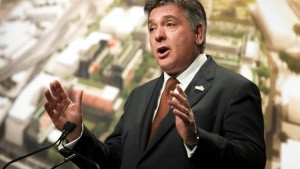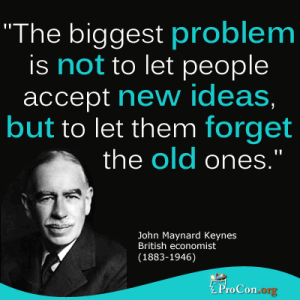 By Ray Rivers
By Ray Rivers
April 9, 2015
BURLINGTON, ON
Ontario’s finance minister, Charles Sousa, boasted that the government had beaten down its projected 2014 deficit target by $1.6 billion, and was on track to eliminate the deficit by 2018.
He was speaking at a Greater Toronto Board of Trade meeting last week, when he announced this good piece of news. And another bit of good news is that a carbon tax doesn’t appear to be in the works.
And why would it be? The McGuinty/Wynne governments already have an outstanding record in fighting climate change. While Canada’s greenhouse gas (GHG) emissions sky-rocketed from 1990 levels, (18% increase to 2012), Ontario’s emissions plummeted by an impressive 6%.
And besides, Ontario electricity customers are already paying a ‘de-facto’ carbon tax through our utility bills, which have increased over the years, in part to pay for the conversion of Ontario’s dated and dirty coal plants to cleaner energy.

Ontario’s Minister of Finance Charles Sousa – watch the hands, they are quicker than the eye.
So rather than hit consumers with another carbon tax, Ontario’s Premier Wynne has decided to join Quebec and California in a continent-wide carbon trading system. Also called cap-and-trade, emissions trading is actually an Ontario-born solution to pollution. A University of Toronto economics professor, Robert Dales, back in the sixties was credited with defining the concept. Ontario’s formal entry into this continental cap-and-trade block will create a market of over 60 million people encompassing almost two thirds of Canadians.
The finance minister noted in his remarks that an additional half-million new jobs have been created since the 2008 recession, and that Ontario has become the top destination for foreign direct investment among jurisdictions in Canada and the U.S.A. Lower oil prices and a falling Canadian dollar are like gifts from heaven for our manufacturers. And with two thirds of our students exercising post-secondary options, the province is leading the country in skilled labour.
So why do we still have this deficit? Ontario already has the lowest per capita spending of any jurisdiction in Canada and, with a predicted growth rate of only 0.8% per annum, it is likely to stay that way. So perhaps the government needs to be looking somewhere else for a solution to its financial predicament. Premier Wynne is apparently exploring the sale of some crown assets, such as Hydro One, which might be in the public interest to divest, and provide some much needed cash to boot.

You see them on the streets of New York – with three walnut shells on a make shift table and asking you to bet on which one the pea is under – it’s a game of the hand being quicker than they eye – the politicians do it all the time – with your money.
But sustainable financing requires more than a fire-sale of crown assets. That would involve re-engineering of the income side of the balance sheet. Alberta, has finally abandoned its ideologically driven flat-tax experiment, conceding that progressive income taxes are essential just to keep its deficit down to $5 billion dollars – a deficit greater than Ontario’s on a per capita basis. Alberta’s premier, Jim Prentice, a former minister in Mr. Harper government, has decided to increase income taxes rather than introduce a sales tax which would unduly penalize those in the middle and lower income classes.
Mr. Sousa tried to make the case that part of Ontario’s income problem lies with the federal government short-changing Ontario, by re-jigging equalization rules over the last few years. He claims that Ontario now contributes $11 million more than it receives in services from the federal government. But that is a hard argument to sell.
How does one measure the benefits Ontario derives from national defence, foreign affairs, national parks, and so on? And the equalization formula, itself, is a moving target, changing with the economic circumstances of each jurisdiction and over time. So the fairness aspect has to be tempered in the context of the leadership role Ontario has always wanted to play in confederation.
But it is true that the feds have been missing in action on a number of fronts, as former finance minister and PM, Paul Martin, noted in a recent article. He cites the neglect being accorded ‘innovation’ and science in general, and the deficit in infrastructure spending, of course. Mr. Harper had announced a $75 billion multi-year infrastructure fund back a few years ago, a program that has turned out to be more effective at advertising his government than actually delivering money for needy projects. And what is $75 billion spread across the nation when Ontario’s needs, alone, total well over a hundred billion?
 According to the great economist John Maynard Keynes, governments should run surplus budgets in good times so they can pay down the debt they need to run in the bad times. Yet the Canadian government has been running deficits ever since the recession ended in 2010 and Ontario is still three years from getting to a balance.
According to the great economist John Maynard Keynes, governments should run surplus budgets in good times so they can pay down the debt they need to run in the bad times. Yet the Canadian government has been running deficits ever since the recession ended in 2010 and Ontario is still three years from getting to a balance.
So the PM has determined that the federal budget, coming down in two weeks, will be accompanied by a spanking new ‘balanced budget’ law. This law, ironically, will mandate the federal government to ‘not do’ what the Harper government ‘has been doing’ for the last four years – running a deficit.
Since the early 1990s most of Canada’s provinces had also enacted balanced budget laws of one kind or another. And since then, almost all of these jurisdictions have either repealed or ignored these unworkable laws. Mike Harris introduced his balanced budget act after running deficits for over half his term in office, and McGuinty repealed the law when he came to power. But McGuinty and Harris each had about the same number of balanced budgets at the end of the day. Quebec, with the worst debt to GDP ratio in the country, has just announced a balanced budget – and this without a new law.
Managing the budget is one of the most important responsibilities for an elected government? Is our PM saying that he can’t be trusted to balance the budget without a new law requiring him to do so? Or is this just a another piece of political gimmickry which he will observe only when it suits. We should recall the ‘fixed elections date’ law which Harper also introduced a number of years ago, then broke, in 2008, when he thought it opportune to try to win an election.
Background links:
Ontario GHG Targets Carbon Tax Ontario Cap and Trade Cap and Trade
Canada’s Emissions Federal Budget Expectations Fed Budget More
Paul Martin on Federal Budget Canada’s High Tech Deficit J.M. Keynes
Balanced Budgets More Balanced Budgets Even More Balanced Budgets

Ray Rivers writes weekly on both federal and provincial politics, applying his more than 25 years as a federal bureaucrat to his thinking. Rivers was a candidate for provincial office in Burlington where he ran as a Liberal against Cam Jackson in 1995, the year Mike Harris and the Common Sense Revolution swept the province.




















The same couturiers who fashioned cap-and-trade were probably also responsible for designing the emperor’s new clothes. A better-worked carbon tax would make each one of us responsible and would:
•ease gridlock
•control urban sprawl
•encourage conservation
•generate revenue to tackle our dilapidated infrastructure and provide more communal urban transit.
A cap-and trade will accomplish none of these goals. It is sad that the provincial government has gone in a different direction.
Fred’s point about waste in the health system is also valid. Administration of health services is not appropriate for either politicians or big pharma and the medical fraternity because of their in-bred sensitivities. A better-worked health system is only possible when we are better informed about making our own health and lifestyle decisions, but nobody seems to have the courage to promote that option. We must explore better utilization of our nurses and paramedics at the community grass-roots level, just as we used to have nurses’ offices in the school and at work, to help educate us to be better, more efficient health-services consumers.
Ray
As a small business owner, we already pay way too much tax once you factor in income taxes, Harpers increases in CPP and EI, employer health taxes, WSIB etc.
Ontario plans to increase that burden on business by having a made in Ontario Pension Plan. Plus they increased income taxes on high income earners.
Provincially, the issue is on the spending side, not the revenue side. We need to make the residents of Ontario know the true cost of health benefits that have been expended on them by the Province. There is a tremendous amount of waste in the health care sector by people going to the doctor or emergency rooms for no reason. Requiring one doctor to send you to another is a waste of money. Requiring a diabetic to visit a doctor to get a prescription for insulin, is stupid. They will need that for life, just issue a lifetime prescription and be done with it. Further, those found to be abusing the system, ie patients who run for to the doctor for no reason, and those doctors who encourage patients to return so they can milk the system for more, need to have restrictions placed on them, or implement user fees.
Something has to give on health care because the current growth trend in costs is not sustainable.